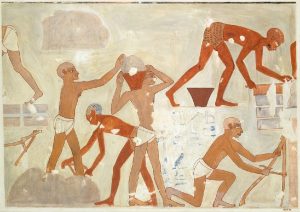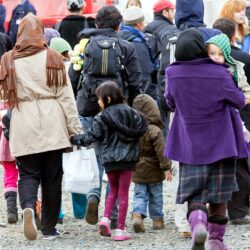| Contribute a translation | Source (English) |
|---|---|
Oh, merciful God who heard the cries of slaves, we beseech you now to hear the prayers of their descendants. Just as you stretch out Your mighty hand to deliver us from our first African captivity in Egypt, we implore you to remember the souls of the millions who were lost in all the places where Your people were held in cruel bondage. | |
The slave ships of the Middle Passage carried us across time as we moved between continents. Only You, our God, are eternal and universal. We are your people, stagnant in our spiritual progress. And because we have not truly understood the meaning of Your Torah, we repeat our mistakes and repeat our captivity in a loop that began in Egypt, followed us to ancient Israel, scattered most us to oblivion in the Assyrian Exile (722 BCE), saw the surviving remnant carried away in the Babylonian Exile (586 BCE). Only the names of our oppressors change. The Greeks persecuted us. The Romans destroyed our Holy Temple and sent survivors wandering aimlessly for centuries. The Spanish Inquisitors tortured us and forced many to forsake their heritage. Our brothers sold us to European slave traders.[2] A reference to African slave-traders in Benin and elsewhere. Eventually and inevitably we once again found ourselves slaves to “a people neither we nor our forefathers had known.”[3] Deuteronomy 28:64. Oh, Lord, as You said, we “came to serve God of wood and stone”[4] Deuteronomy 4:28, cf. Deuteronomy 28:64. because we rejected the Creator and abandoned our covenant. The slave ships of the Middle Passage carried your ignorant people across an ocean that could have made from the tears of Your lost and forgotten people. From the point of “No Return” in Ghana,[5] a reference to Elmina Castle. we cried out to you “My God, my God, why hast though forsaken me.”[6] Psalms 22:2. From the ports of Jamaica, Haiti, and Barbados, the blood of Your people grew the sugar cane that sweetened the lives of our oppressors. Our sweat made them rich and powerful. From the auction blocks of Virginia to the rice fields of South Carolina, we have been slaves to man because we refuse to freely serve God. Just as we made bricks for Pharaoh, we picked cotton for master. The crack of the whip echoes through our history. | |
“By the rivers of Babylon we sat and wept when we remembered Zion. There on the poplars we hung our harps, for there our captors asked us for songs, our tormentors demanded songs of joy; they said, ‘Sing us one of the songs of Zion!’ How can we sing the songs of the LORD while in a foreign land?”[7] Psalms 137:1-4. On the banks of the Mississippi, we fell down and raised our hands to Thee while those who hung our bodies from poplar trees said, “Sing us one of the songs of Zion!” With tears in our eyes we sang “Go Down Moses,” “Marching to Zion,” “Roll Jordan Roll” and “Wade in the Water.” | |
On this night of Passover, as we remember our first African enslavement in Egypt, let us also spill a drop of wine as we recount some of the other places where the blood of Your people were shed. Hallowed placed like Auschwitz, Treblinka, and Buchenwald, which are remembered for the suffering that our people endured there during the Holocaust, stand in our memory along with the forgotten places where our Israelite ancestors where taken into captivity at Goree Island, Senegal; Bridgetown, Barbados; Kingston, Jamaica; and Jamestown, Virginia. | |
Our ancestors forgot the true meaning of Passover. They failed to heed the warning and dire prophecy contained in your Torah: “Thou shalt betroth a wife, and another man shall take her: thou shalt build a house, and thou shalt not dwell therein: thou shalt plant a vineyard, and shalt not gather the grapes thereof. . . Thy sons and thy daughters shall be given unto another people, and thine eyes shall look, and fail with longing for them all the day long: and there shall be no might in thine hand. . . Thou shalt beget sons and daughters, but thou shalt not enjoy them; for they shall go into captivity. . . And the LORD shall scatter thee among all people, from the one end of the earth even unto the other; and there thou shalt serve other gods, which neither thou nor thy fathers have known, even wood and stone.”[8] Deuteronomy 28:30‐64. Thy word is true and just. Thy prophecy of repeated enslavement has been visited upon us with terrible wrath. Our Israelite ancestors lost more than their lives–they lost their identities. Act now as you have promised. Gather your dispersed people from all the places where they were scattered. Bring us back to you in whole-hearted repentance. Restore your forgotten and exiled people. Give us back our names, language, land, culture, values, mission, and heritage as an everlasting covenant. Amen. |
This prayer was written by Sholomo ben Levy for use in the Passover Freedom Haggadah (IIBR 2019). There, the prayer appears between the recitation of the Ten Plagues and the piyyut, Daiyenu.
[The IIBR is the governing body of its dozen or so affiliated congregations within the Black Hebrew Israelite (BHI) religious movement. IIBR’s chief rabbi, Capers C. Funnye Jr., board member of Kulanu and member of the Chicago Board of Rabbis (among other Jewish organizations), seeks rapprochement and healthy engagement with recognized Jewish communities. (This is in sharp contrast to the violence, supercessionist and antisemitic vitriol espoused within the context of messianic Black nationalism by other BHI groups). For more on the history of the IIBR stream of the BHI movement, find these articles at the Forward, the Religion News Service, and Tablet. Common BHI identification as “Jews” remains in serious conflict with the standards accepted by most established Jewish communities and denominations. Common BHI identification with “Black Jews” is wholly rejected by actual Jews of Color in North America and Israel directly harmed by misidentification with BHI. This prayer, written for Black Israelite congregations for the Passover seder and shared with the Open Siddur, asserts a historical connection between the descendants of African slaves in the Americas and Israelite descendants in Africa caught up in the slave trade — an assertion widely rejected as partaking in historical revisionism but which is central to Black Hebrew Israelism.
We support IIBR in continuing a long process of Judaizing within the history of Black Hebrew Israelism while leading congregations of people claiming Jewish and/or Israelite identity. We applaud the direction of IIBR chief rabbi Funnye in bringing his congregations closer to Judaism, in learning and practice. We recognize the diversity of vulnerable crypto-Jewish and non-Jewish communities worldwide following their own local and distinct pattern of Judaizing, often in resistance to Christian missionizing in the aftermath of colonialization. We share this prayer in solidarity with people worldwide struggling to recover or construct a meaningful, authentic, and integral cultural identity in peace and understanding with their Jewish co-religionists (while never, ḥas v’shalom, denying historical Jewish identity or confusing its origin). –Aharon Varady, founding director, the Open Siddur Project, (Erev Passover 5781/2021)]
Source(s)

Notes
| 1 | IIBR stands for the International Israelite Board of Rabbis. Spiritual leaders within the IIBR are granted the title of “rabbi.” |
|---|---|
| 2 | A reference to African slave-traders in Benin and elsewhere. |
| 3 | Deuteronomy 28:64. |
| 4 | Deuteronomy 4:28, cf. Deuteronomy 28:64. |
| 5 | a reference to Elmina Castle. |
| 6 | Psalms 22:2. |
| 7 | Psalms 137:1-4. |
| 8 | Deuteronomy 28:30‐64. |

“Prayer for Israelites Lost in the Trans-Atlantic Slave Trade, by Sholomo ben Levy” is shared through the Open Siddur Project with a Creative Commons Attribution-ShareAlike 4.0 International copyleft license.









Leave a Reply